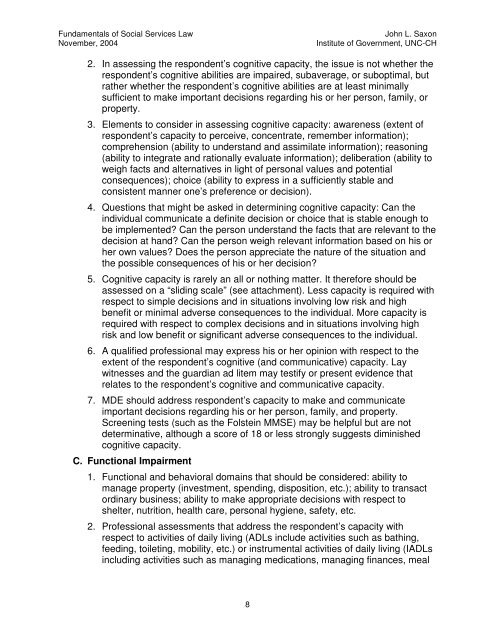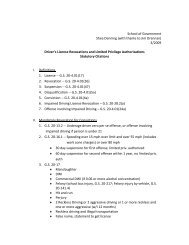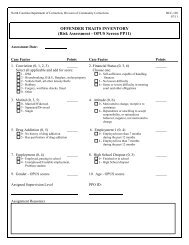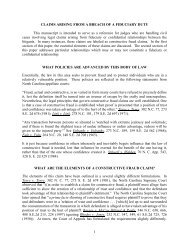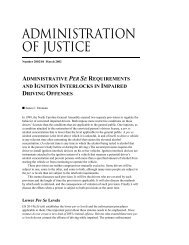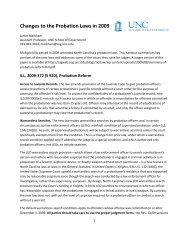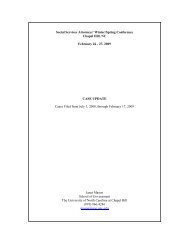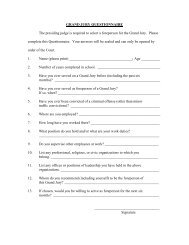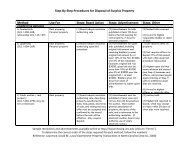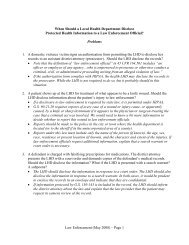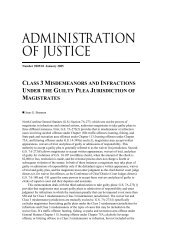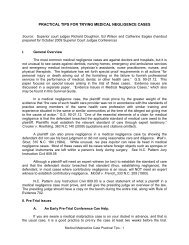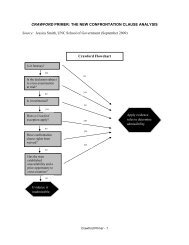Guardianship of Incapacitated Adults: A Summary of North Carolina ...
Guardianship of Incapacitated Adults: A Summary of North Carolina ...
Guardianship of Incapacitated Adults: A Summary of North Carolina ...
Create successful ePaper yourself
Turn your PDF publications into a flip-book with our unique Google optimized e-Paper software.
Fundamentals <strong>of</strong> Social Services Law<br />
November, 2004<br />
John L. Saxon<br />
Institute <strong>of</strong> Government, UNC-CH<br />
2. In assessing the respondent’s cognitive capacity, the issue is not whether the<br />
respondent’s cognitive abilities are impaired, subaverage, or suboptimal, but<br />
rather whether the respondent’s cognitive abilities are at least minimally<br />
sufficient to make important decisions regarding his or her person, family, or<br />
property.<br />
3. Elements to consider in assessing cognitive capacity: awareness (extent <strong>of</strong><br />
respondent’s capacity to perceive, concentrate, remember information);<br />
comprehension (ability to understand and assimilate information); reasoning<br />
(ability to integrate and rationally evaluate information); deliberation (ability to<br />
weigh facts and alternatives in light <strong>of</strong> personal values and potential<br />
consequences); choice (ability to express in a sufficiently stable and<br />
consistent manner one’s preference or decision).<br />
4. Questions that might be asked in determining cognitive capacity: Can the<br />
individual communicate a definite decision or choice that is stable enough to<br />
be implemented? Can the person understand the facts that are relevant to the<br />
decision at hand? Can the person weigh relevant information based on his or<br />
her own values? Does the person appreciate the nature <strong>of</strong> the situation and<br />
the possible consequences <strong>of</strong> his or her decision?<br />
5. Cognitive capacity is rarely an all or nothing matter. It therefore should be<br />
assessed on a “sliding scale” (see attachment). Less capacity is required with<br />
respect to simple decisions and in situations involving low risk and high<br />
benefit or minimal adverse consequences to the individual. More capacity is<br />
required with respect to complex decisions and in situations involving high<br />
risk and low benefit or significant adverse consequences to the individual.<br />
6. A qualified pr<strong>of</strong>essional may express his or her opinion with respect to the<br />
extent <strong>of</strong> the respondent’s cognitive (and communicative) capacity. Lay<br />
witnesses and the guardian ad litem may testify or present evidence that<br />
relates to the respondent’s cognitive and communicative capacity.<br />
7. MDE should address respondent’s capacity to make and communicate<br />
important decisions regarding his or her person, family, and property.<br />
Screening tests (such as the Folstein MMSE) may be helpful but are not<br />
determinative, although a score <strong>of</strong> 18 or less strongly suggests diminished<br />
cognitive capacity.<br />
C. Functional Impairment<br />
1. Functional and behavioral domains that should be considered: ability to<br />
manage property (investment, spending, disposition, etc.); ability to transact<br />
ordinary business; ability to make appropriate decisions with respect to<br />
shelter, nutrition, health care, personal hygiene, safety, etc.<br />
2. Pr<strong>of</strong>essional assessments that address the respondent’s capacity with<br />
respect to activities <strong>of</strong> daily living (ADLs include activities such as bathing,<br />
feeding, toileting, mobility, etc.) or instrumental activities <strong>of</strong> daily living (IADLs<br />
including activities such as managing medications, managing finances, meal<br />
8


